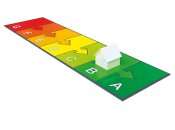Lower energy bills lead to higher energy demand

Household energy consumption is decreasing thanks to energy efficiency policies but, as a result of the lower energy bill, consumers use more energy. The effect is that approximately one third of the energy efficiency gains is cancelled out. This is concluded by economist Erdal Aydin in his PhD thesis, which he will defend on January 13, 2016, at Tilburg University.
Aydin came to this conclusion following detailed quantitative research into the effects of two important energy efficiency policies: the mandatory energy label for household appliances and the stricter insulation requirements for new dwellings. He analysed data on thirteen EU countries over a period of three decades.
Practice has shown that energy efficiency policies are not always as effective as predicted. Consumers do not always readily adopt new technologies. They often prefer inexpensive appliances, that usually consume too much energy, to energy-efficient appliances that are slightly more expensive but much cheaper to use. Moreover, new technologies can also affect people's consumption behavior. For instance, research has shown that, in a well-insulated home, people tend to turn the heating up a degree or so. The phenomenon that the energy demand increases as the energy bill is lower is known as the rebound effect. How large that effect could be had hardly been investigated, in any case, not on a large scale.
Aydin first of all investigated whether or not energy efficiency policies have an effect. "To that end, I used data on energy consumption and energy efficiency policies in the residential sector in Europe between 1980 and 2009. I was able to show that the mandatory energy labels for household appliances as well as the stricter building regulations have led to a decrease in energy consumption." To be able to quantify the rebound effect, Aydin used the data of 563,000 Dutch dwellings and their residents. They showed that, on average, one third of the energy efficiency gains is offset by the increased energy demand of the households concerned. The differences in the behavioral response between the categories of residents was significant. Aydin: "Homeowners are more economical than people who are renting. Homeowners showed a rebound effect of 26.7 percent; for tenants, it was 41.3 percent."
Differences in income are also a factor. "The rebound effect is larger for low incomes than for high incomes. Moreover, this effect is larger in households whose energy consumption was above average to start with."
Aydin's findings can be used to determine the effectiveness of energy efficiency policies.
Provided by Tilburg University




















